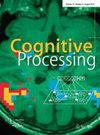为什么狗狗喜欢 "zoomies "而不是 "zoom",它告诉我们人与人之间的会面对学习和记忆的重要性。
IF 1.4
4区 心理学
Q3 PSYCHOLOGY, EXPERIMENTAL
引用次数: 0
摘要
人们通常会观察到狗的一些行为,比如俗称 "zoomies "的突然爆发性身体运动,以及狗喜欢把鼻子伸出车窗外和在狗公园里仔细嗅闻,因此人们普遍认为狗是通过嗅觉来学习和交流的,这一点也不奇怪。虽然人们普遍不重视自己的嗅觉灵敏度和嗅觉的重要性,但人类也通过嗅觉学习和交流,在某些情况下甚至比狗更好。在本文中,我们将讨论为什么这种信息交流对学习和记忆很重要,以及为什么虚拟会议不能通过嗅觉测试。本文章由计算机程序翻译,如有差异,请以英文原文为准。
Why dogs prefer zoomies to zoom and what it tells us about the importance of in-person meetings for learning and memory.
As people commonly observe dog behaviors like the sudden bursts of physical movement colloquially known as "zoomies," and the canine penchant for sticking their nose out of car windows and for sniffing intently in dog parks, it is not surprising that people generally believe dogs learn and communicate by smell. While people generally discount their own olfactory sensitivity and the importance of smell overall, humans also learn and communicate by smell, in some cases even better than dogs. In this article, we discuss why this information exchange matters for learning and memory and why virtual meetings don't pass the sniff test.
求助全文
通过发布文献求助,成功后即可免费获取论文全文。
去求助
来源期刊

Cognitive Processing
PSYCHOLOGY, EXPERIMENTAL-
CiteScore
3.10
自引率
5.90%
发文量
44
期刊介绍:
Cognitive Processing - International Quarterly of Cognitive Science is a peer-reviewed international journal that publishes innovative contributions in the multidisciplinary field of cognitive science. Its main purpose is to stimulate research and scientific interaction through communication between specialists in different fields on topics of common interest and to promote an interdisciplinary understanding of the diverse topics in contemporary cognitive science. Cognitive Processing is articulated in the following sections:Cognitive DevelopmentCognitive Models of Risk and Decision MakingCognitive NeuroscienceCognitive PsychologyComputational Cognitive SciencesPhilosophy of MindNeuroimaging and Electrophysiological MethodsPsycholinguistics and Computational linguisticsQuantitative Psychology and Formal Theories in Cognitive ScienceSocial Cognition and Cognitive Science of Culture
 求助内容:
求助内容: 应助结果提醒方式:
应助结果提醒方式:


